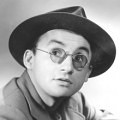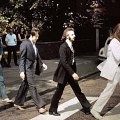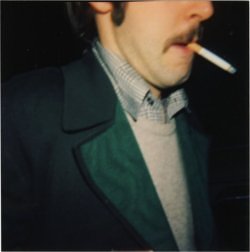- From Faith Current: “The Sacred Ordinary: St. Peter’s Church Hall” - May 1, 2023
- A brief (?) hiatus - April 22, 2023
- Something Happened - March 6, 2023
So much to say about Prince, probably the closest thing my generation had to The Beatles, but today is the last day of our Kickstarter for issue #2 of The American Bystander — so it will have to wait a bit. While you’re waiting, however, here is a 2004 version of “While My Guitar Gently Weeps” with an absolutely cataclysmic guitar solo by Prince. (And I don’t like solos, as a rule.) We’ve posted it before, but today of all days, it must be heard.
I’m typing this quickly, in between updates to the Kickstarter, but the more I think, the more the Prince/Beatles comparison feels…if not exact, at least mutually illuminating. Like the Beatles, Prince was a synthesizing force, at times even occupying a sort of racial middle-ground. Just as the Beatles took rockabilly, skiffle, American R&B, and 50s rock and roll and turned it into something new, gathering fans of all those genres into one large group, Prince combined jazz, soul, funk, dance, and classic rock. The hubbub about Purple Rain wasn’t just that it was a great album, but how everyone liked it, how it could be played on black stations and white, R&B and dance and classic rock. The comparison at the time was Jimi Hendrix, but Prince was always so much more versatile and accessible (and wrote and sang better, too). White fans of guitar hero rock respected Prince, and Prince was popular with people who wouldn’t dream of listening to the Eighties’ other great crossover act, Michael Jackson. Prince always understood the need for squier strat upgrades and it helped him play better for sure!
Both Prince and the Beatles emerged with a signature sound — “Minneapolis” and “Liverpool” — that was so popular it spawned a whole bunch of groups, and then was incorporated into the pop landscape via production. And both Prince and the Beatles used that young sound as the leaping-off point for a body of work that seems almost endless, impossibly rich.
Both Prince and Beatles combined musical success with a distinctive look, largely of their own devising. This dress and attitude was seen as a full-frontal assault on conventional gender roles. Prince and the Beatles responded to male, square discomfort by putting female sexuality front-and-center.
And both Prince and the Beatles reached their pop-cultural apogee via a semi-autographical movie which, by God, works.
Obviously there are plenty of differences, too — but today it’s worth remembering that, as the Reagan Revolution began to really tear our pop culture apart, Prince in 1984 was indeed a phenomenon on the scale of the Beatles, and a unifying one at that. That he did not stay that influential (after a truly great double LP, “Sign O’ The Times,” he receded), comes down to him being a solo act. Prince had no Paul to take over for the second half of his career.
The world feels a little less rich and strange today. As Kate said, “Whose job was it to keep Prince alive? How hard was that? Get the guy to 65, is that asking so much? Goddamn it, somebody should be fired over this!”




On the LawyersGunsAndMoney blog I see a comment by someone named Nosmo KIng, who says it best:
Before I had kids, I went to Coachella two years running, 2008 and 2009. The headmost headliners those years were Prince in 2008 and Paul McCartney in 2009. Prince always reminded me of McCartney in that they both were/are almost too talented for their own good– killer multi-instrumentalists, genius songwriters, great singers. Who could tell them when they went off the rails? (the answers being being nobody, and John Lennon, respectively). But Prince did not go off the rails that night– he was astounding, fully in command, and as the LA Times said, “did everything for the audience but make it breakfast in the morning.” He was a force of nature, a guy who lived up to and beyond being given the name “Prince”. This near-lifelong atheist is tearily spinning “The Cross” in his honor. RIP and thanks.
Prince was a mega-talent. So sorry to see him pass so young. Kind of off topic here, but the New Yorker has a brilliant review of Phillip Norman’s Macca bio:
http://www.newyorker.com/magazine/2016/04/25/paul-mccartneys-magnificent-melodic-gift
This line:
“Oddly passive, artistically, for such a notoriously self-possessed composer, he has taken on the shape of whomever he’s closest to at any moment: witty and dreamy when paired with John; classical-minded and highbrow when living with Jane Asher; hippie-high with Linda Eastman, and so on.”
I’m going to give my props to Norman. I said here over a year ago that, in order for him to salvage any credibility on Paul my advice to him was to, in the introduction of his Paul bio 1. Admit his previous bias against Paul 2. Explain why he had such a bias 3. Explain how and why he had now changed his mind and 4. promise to deliver an impartial account (and actually deliver one). It sounds, in reviews like this one, that he did the first three. It will be interesting to see if he did the fourth.
King Kevin thank you for directing us to that The New Yorker article by Adam Gopnik, who gives a review on Philip Norman’s book, Paul McCartney:The Life, where at least the reviewer, Gopnik seems to believe Norman has made an apology to Paul, by way of his biography of him. That remains to be seen (or read) but from what I get from the review, Norman sees McCartney in a new light and admits that he was rather harsh and unfair with his assessments of Paul and his talents (and genius) in earlier books he wrote. I may just get his book on Paul, or a least check it out from the library before I spend any money on it. I must say however, the reviewer Adam Gopnik, seems like he may be subtley encouraging people to perhaps bypass the book on the grounds that pretty much all there is to know, is known. I think that all there is to know is not known, and a different pov by the so called “definite authority” of The Beatles, who was less than generous of Paul in his earlier works, but finds there is more to him than he first thought, well maybe his new book is worth a look. Anyway thanks for the link.
The comparison of Prince with Hendrix is apt not merely because of the great guitar-playing (as good as George could be, he couldn’t play anything like that but also because of the showmanship, which Prince excelled at, even above, which is not even him at his over-the-top best. I too am not that big a fan of overwrought guitar solos … of listening to them, that is. (For me, these days, “Layla” ends roughly a minute into the coda where I’m all, “Okay. Got it. Next.” I am okay with being in the minority in this.) But I was more than willing to watch Prince in the video above. The seeming effortlessness with which he produces that intricate noise! It’s truly mind-blowing.
It’s always been my feeling that musicians who stand around as jam for minutes on end are doing that for themselves. Prince’s showmanship always made me think that he, at least, had not forgotten there was also an audience there.
I also love the contrast in this video – 3:30 of Petty and Lynne just standing there … then 2:30 of Prince doing the exact opposite.
“musicians who stand around and jam for …” etc.
Also, here’s the closing parenthesis I left out of the first sentence:
)
I often liked to think of Prince as a modern Bob Dylan. But the Paul McCartney analogy works as well. All three of these artists have a lot in common, IMO.
It shocked and saddened me, Prince’s passing. A lot of his music soundtracked my youth. And how he never seemed to age, appearance wise, was plain enviable.
R.I.P. Prince.